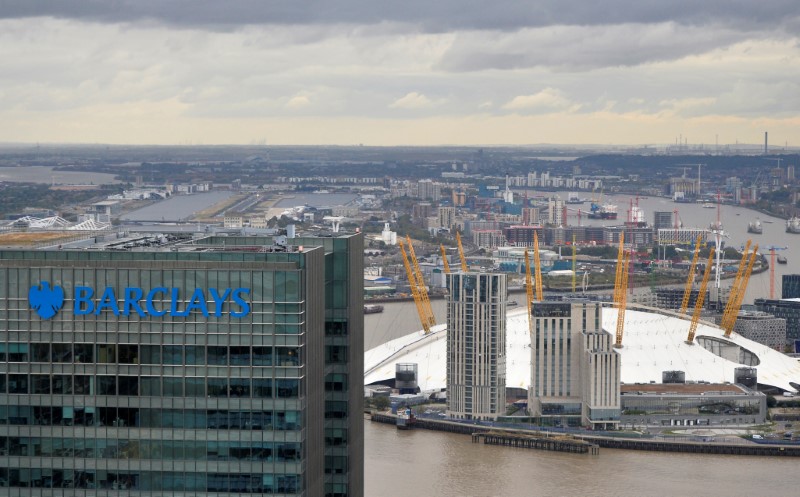(Bloomberg) -- With the costliest U.K. banking scandal fading into memory, a Brexit deal looking more plausible than it once did and trading likely to surprise on the upside, British lenders are going into earnings season with the wind in their sails for once.
That doesn’t mean the numbers won’t have ugly spots. Third-quarter results, which kick off this week, are expected to show damage from the most recent casualty in corporate Britain -- Thomas Cook Group Plc (LON:TCGI) -- and a stretched consumer that’s pulled back in the run-up to Brexit. That’s likely to be most negative for the two big domestically-focused lenders, Lloyds Banking Group PLC (LON:LLOY) and Royal Bank of Scotland Group PLC (LON:RBS). Rock-bottom interest rates don’t help either.
Then, there are the unexpectedly massive final charges for mis-sold payment protection insurance. However, banks disclosed most of the damage in the days after the Aug. 29 deadline for customers to claim redress, and it’s likely priced into their stocks. And in a positive omen for Barclays PLC (LON:BARC), many of Wall Street’s trading giants posted better-than-expected revenue from equities and fixed income -- but Jes Staley’s British investment-banking flagship will have to show expenses are under control.
“Net interest margin pressures and shrinking interest income revenues, coupled with stagnant non-interest income, remain the key challenges for U.K. banks,” said Jonathan Tyce, an analyst at Bloomberg Intelligence. “The obvious solution continues to be further cost cutting.”
Asian Tensions
The sudden geopolitical crisis facing HSBC Holdings PLC (LON:HSBA) and Standard Chartered PLC (LON:STAN) in 2019 was not Brexit, but the unrest in Hong Kong. For both Asian-focused lenders, the territory is their biggest single market.
The banks have both played down the financial impact of the protests, and have also sought to assuage concerns that the wider U.S.-China trade war has had on their businesses. Standard Chartered CEO Bill Winters will also be hoping to show further progress in cutting costs.
Brexit
All of the banks have repeatedly said they are ready for any Brexit scenario, and some have taken provisions to prepare for a surge in bad loans in the event of a departure without a deal. However, an official in U.K. Prime Minister Boris Johnson’s office has said if the European Union agreed to a request from the British Parliament that Brexit be delayed until Jan. 31, then the prime minister would call an election instead.
David Herro, chief investment officer for international equities at Harris Associates in Chicago, holds shares of U.K. banks. “Any deal is better than no deal” for those lenders, he said on Bloomberg Television.
Some of the damage is already done, though. Unemployment has stayed low in Britain, but consumers have restrained their spending amid Brexit worries. While that wasn’t the only factor that doomed Thomas Cook, the storied travel company, it didn’t help.
Bad Loans, PPI
About 17 lenders, including RBS, were involved in Thomas Cook’s bankruptcy talks, and investors expect losses to be spread over those banks. Lloyds, for its part, said in its second-quarter report that its impairments grew, partly due to two specific companies that it didn’t name. The bank also pointed to potential trouble in car loans, booking an additional impairment as used-car prices weakened.
“Hopefully impairments are going to be low,” said Eric Moore, a portfolio manager at Miton Group who holds U.K. bank shares. “There has been less growth than expected, and lending has been very hard.”
Barclays (LON:BARC) and Lloyds (LON:LLOY) put aside as much as 3.4 billion pounds more for the PPI scandal, which saw customers sold insurance they didn’t want or need for years. At Barclays, “the PPI charge will be the biggest drag on capital and tangible net asset value generation this quarter,” analysts at Deutsche Bank AG (DE:DBKGn) said.
Barclays Trading
JPMorgan Chase & Co.'s (NYSE:JPM) corporate and investment bank had its best third quarter in three years. Goldman Sachs Group Inc (NYSE:GS) had a more mixed picture, but still beat estimates in equities. Those results are good news for Barclays (LON:BARC), and to a lesser extent for HSBC, the sprawling global lender that’s paring back its own trading operations.
Barclays should post a 4% income increase at its corporate and investment bank, analysts at Jefferies said, while Deutsche Bank AG analysts are also expecting good results from the division -- which has been the focus of a sustained critique from activist investor Edward Bramson.
At Barclays, “the focus will be squarely on cost control and ability to deliver on the adjusted 2019 goal,” analysts at Bloomberg Intelligence said. Other key businesses for Barclays include credit cards and payments, where Deutsche Bank analysts predict a positive performance.
Earlier this month, Barclays published estimates for the corporate and investment bank for the first time in three years. Analysts surveyed by the bank expect 2.4 billion pounds in revenue and profit before tax of 714 million pounds, both showing an increase from the same quarter of last year.
Leadership Changes
HSBC’s results will be the first outing for acting CEO Noel Quinn after the ouster of John Flint. Investors might also hear from Nigel Higgins, the veteran Rothschild & Co. rainmaker who became Barclays’ chairman in May. RBS’s Ross McEwan is departing for Australia, replaced by Alison Rose as CEO on Nov. 1. At Lloyds, William Chalmers, the new finance chief, faces reporters and analysts for the first time.
The new executives are facing a new decade, free of some of the issues that bedeviled their predecessors but still hampered by others.
“Banks are set to enter 2020 with PPI and Brexit -- two areas that have impacted earnings, capital and suppressed valuation -- behind them,” said Joseph Dickerson, an analyst at Jefferies.
